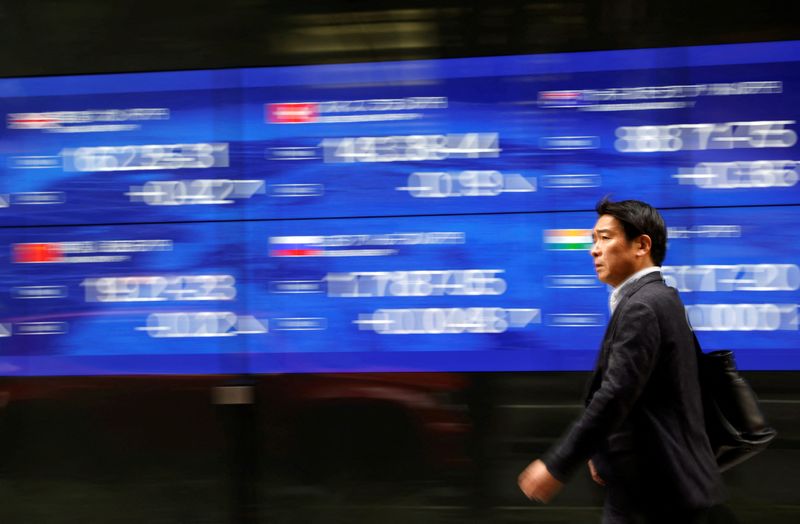Asian stocks extend new year rout; China walloped by Fitch downgrades

Most Asian stocks fell on Thursday, extending declines after a weak start to the year on doubts over the timing of U.S. interest rate cuts, while Chinese markets were battered by Fitch downgrading four major state-owned asset managers.
Regional markets took a weak lead-in from Wall Street, with U.S. stock benchmarks falling for a second straight session on Wednesday as sentiment towards equities remained on edge. U.S. stocks also saw a heavy dose of profit-taking after a stellar melt-up through December.
Chinese stocks slide as Fitch downgrades 4 major asset managers
China’s bluechip Shanghai Shenzhen CSI 300 index was the worst performer in Asia on Thursday, losing 1.4% and hovering above a five-year low, while the Shanghai Composite index dropped 0.9%.
Fitch downgraded the ratings of four Chinese state-owned asset managers by one level, and put three of the four firms on watch for more potential downgrades.
The ratings agency cited increasing pressure on the four from an ongoing slump in the property market, as well as increased uncertainty over the government’s ability to support the finances of the asset managers. This in turn presented uncertainty over the ability of the state-backed firms to snap-up non-performing assets from the open market, which bodes poorly for China’s financial markets.
The downgrade presents another blow to sentiment towards China, and also comes a few weeks after Moody’s (NYSE:MCO) warned of a potential downgrade to China’s sovereign rating.
A positive private survey on the services sector did little to inspire confidence in the country, with the Caixin Services PMI showing that China’s service sector grew more than expected in December.
Chinese stocks were among the worst-performing major stock indexes in 2023, as a post-COVID economic rebound largely failed to materialize.
Among other Asian markets, Japan’s Nikkei 225 index fell 0.8% in catch-up trade after an extended new year’s holiday. Sentiment towards Japan was also rattled by a devastating earthquake earlier this week, which killed scores of people and caused widespread disruption in central Japan.
Purchasing managers index (PMI) data showed that Japanese manufacturing activity remained in contraction in December.
Losses in heavyweight technology stocks also weighed on the Nikkei, mirroring a trend seen across most stock markets.
Asian tech falls further as rate cut uncertainty persists
Technology-heavy indexes continued to bear heavy losses as markets second-guessed just when the Federal Reserve could begin trimming interest rates this year. South Korea’s KOSPI fell 0.9%, while Hong Kong’s Hang Seng index shed 0.4%.
The minutes of the Fed’s December meeting showed central bank officials acknowledging progress against inflation over the past year. But the minutes also offered few cues on when the bank could potentially begin trimming interest rates as signaled during the meeting.
The minutes showed policymakers concerned over a soft landing for the U.S. economy, and whether monetary policy was too restrictive.
While the Fed is still expected to trim rates by at least 75 basis points in 2024, markets remained uncertain over the timing of the potential cuts. This spurred a heavy dose of profit-taking in tech stocks, which had risen sharply through December on the prospect of rate cuts this year.
Markets were also cautious before nonfarm payrolls data due this Friday, which is expected to factor into monetary policy.
Broader Asian stocks extended recent losses, with Australia’s ASX 200 falling 0.3% and coming further off a recent 2-1/2-year high. PMI data showed Australia’s services sector remained in contraction through December.
India’s Nifty 50 index opened 0.4% higher, although the index still remained vulnerable to more profit-taking after hitting a series of record highs in December. PMI data on Wednesday showed Indian manufacturing activity grew less than expected in December.





